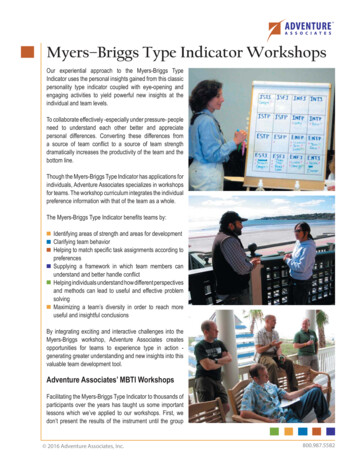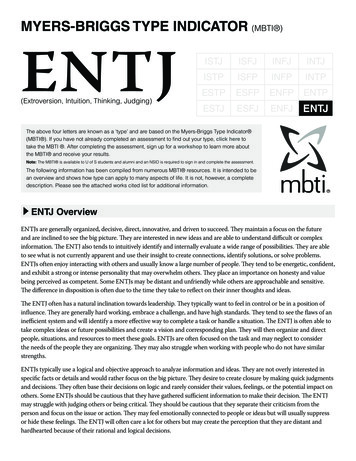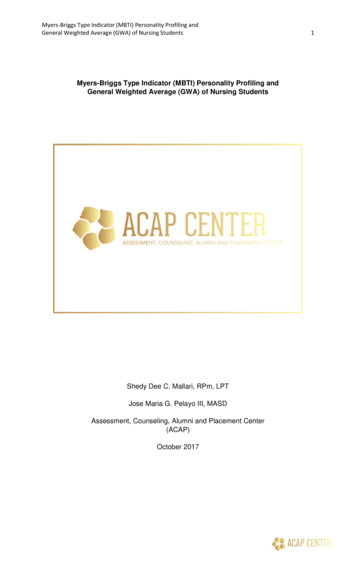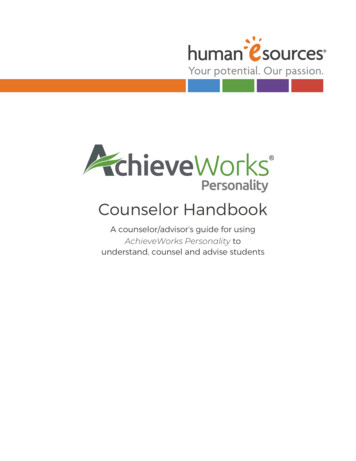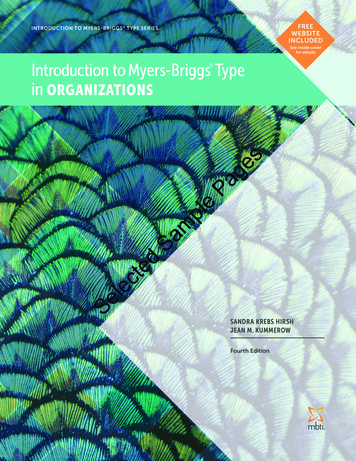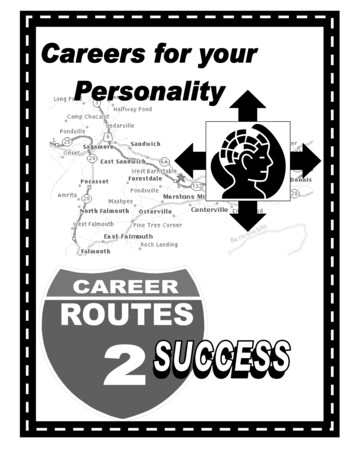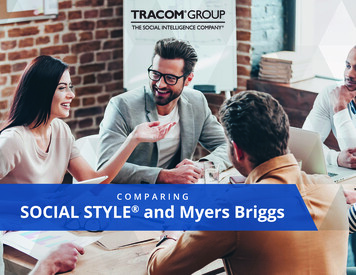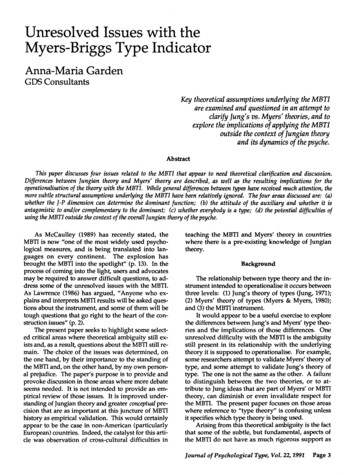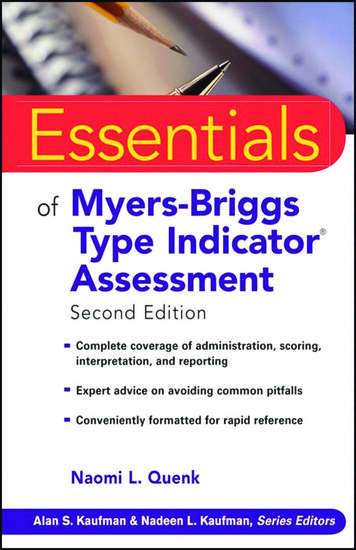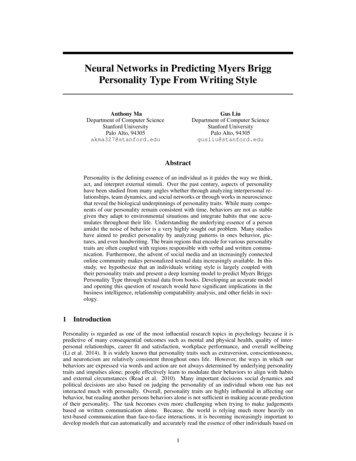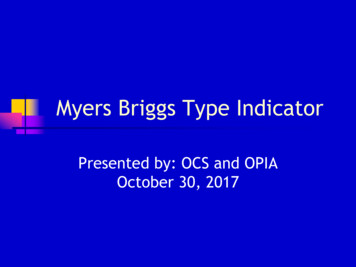
Transcription
Myers Briggs Type IndicatorPresented by: OCS and OPIAOctober 30, 2017
Today’s Presentation Discuss self-assessment in generalExplain the Myers-Briggs Type Indicator(MBTI)Define and examine “type” (innatepreferences)Discuss what these preferences meanfor your life and your professionalchoices
The Importance of SelfAssessment Allows you to make informed choicesWithout self-assessment career satisfaction isa gambleThe MBTI is just one self-assessment tool.
What is type? The theory of psychological type comes from Swisspsychiatrist Carl G. Jung (1875-1961).Jung observed and analyzed the way people take inand then process and organize information.He laid out his theory of “personality” and in 1921wrote that ”What appears to be random behavior isactually the result of differences in the way peopleprefer to use their mental capacities.”
Myers Briggs Type Indicator During World War II, the mother-daughter team ofIsabel Briggs Myers and Katharine Cook Briggs, setout to find an easier way for people to use Jung'sideas in everyday life.The MBTI is one of the most widely usedpsychological assessments in the world and has beenvalidated in over 8,000 research studies
The Persistence of Type Type is generally ingrained and does notchange over time.However, the strength of your preferencesmay change as your have life experiencesand adapt to new situations.
Keep in mind . . . Each type is equally validDoes not assess: IntelligenceAptitudeSkillNormalcy
Limitations of Type Analysis EVERY type can do EVERY job.However, some careers or practiceareas will feel more comfortable toindividuals with certain preferences.The suggestions we will discuss aremeant to serve as starting points.Type is only one facet of careersatisfaction
Taking The MBTI Test 93 questions.Answer as you are, not as you hope tobe.No right or wrong answers.If you get stuck on a question, skip andcome back to it.
Taking the Test Cont’d The answer to some questions will be“it depends.”If this is the case, answer as you aremost of the time, in a relaxed setting.When you are finished, score the testand you will come up with your 4-lettertype.
16 MBTI NTPESTJESFJENFJENTJ
Understanding Type andCareer Choice Preference dictates natural inclinationDeveloping adaptive strategies to workagainst typeEnvironment can shift strength ofpreference but does not negatepreferenceType can be really helpful whendeciding on work environment
Type:4 Dimensions of PersonalityExtraversion (E) - Introversion (I)Where and how you get your energySensing (S) – Intuition (N)How you take in informationThinking (T) – Feeling (F)How you make decisionsJudging (J) – Perceiving (P)How you order your life
Extravert v. Introvert
Extraversion and IntroversionWhere and how do you get your energy?Extraverts Energized by being with othersSometimes enjoy being thecenter of attentionTend to think out loudCommunicate with enthusiasmExpressiveSociableIntroverts Energized by spending timealoneSometimes avoid being thecenter of attentionThink things through beforecommunicatingMore low keyReserved
Practice Areas Extraverts MayPreferEmployment Law Needs lots of interactionwith peoplePrefers variety of tasksLearns by talking anddoingPrefer a faster-pacedenvironmentFind a place where youhave the potential to bea “player”- corporate,RE, team-drivenlitigation Corporate (some types atthe more senior level)LitigationCriminal (DA, AG, PD)Entertainment lawFamily lawLegal servicesField work in human rightsPolitics/lobbyingLabor unionsCollaborative policy workAlternative DisputeResolutionManagement consulting
Potential Issues for Extraverts(and Adaptive Strategies) Desk work or research-heavy positions may feeloppressive Too much quiet and solitude may be draining;prefer “open door” workplaces where thinking outloud to solve problems is acceptable Schedule time away from desk; become involved in activitiesthat increase face time with clients/colleaguesBe conscious of environment when investigating opportunitieswith employersIdentify practice areas that promote a team approach toproblem solving and foster regular client interactionSingular activities may zap your energy Get involved in committees (i.e., recruiting, young associates,professional development) both within and outside of youremployer
Practice Areas Introverts MayPrefer Need time and spacefor concentrationPrefer environmentwhere one can focus ona taskPrefers workindependently withoutinterruptions Pay attention to lawfirm or organization’satmosphere, size andstructure JudgeAppellate litigationThink tanksImpact litigationTax and ERISAEnvironmentalAntitrustLicensing and technologytransferCorporate governanceRegulatory (FDA, FCC, SEC,etc.)Mutual fund compliance andinvestment advisors work
Potential Issues for Introverts(and Adaptive Strategies) Positions requiring lots of chatting and face-toface interaction (i.e., sales, consulting), may bedraining Large groups might exhaust you Bake in periods during the day to allow for quiet reflection andwork– this is rarely an issue in most practice settings, butmight be challenging in connection with some types of publicinterest workGravitate toward smaller organizations that staff projects leanlyPrefer environments where you are able to actautonomously, solve problems on your own andhave some control over interactions with others Beware of highly hierarchical organizations
Sensor v. Intuitive
Sensing and IntuitionHow you take in informationSensing You take in informationthrough your senses, andfocus on the here and nowTrust in the certain andconcreteValue realism and commonsenseLike to use and honeestablished skillsPresent information in astep-by-step fashionWork well with detailsIntuition Future-focusedTrust inspiration andinferenceValue imagination andinnovationBored easily after masteringtasksPresent information throughleaps, in a roundaboutmannerTend to be general andfigurative
Practice Areas Sensors MightPreferCommercial Real Estate Drawn to realistic andpractical work activitieswhere immediateproblems need to besolved.Will likely prefer todevelop expertise in agiven areaLikes working withconcrete issuesBeing able to see theend result will besatisfying M&A workLegal servicesCriminal (DA/PD)Legislative/lobbying workCommunity developmentEconomic developmentTaxTrusts & EstatesFund Formation (PrivateEquity and Hedge Fund)Code-based or RegulatorypracticesProbate judgeLand court judgeLabor & Employmentadvisory work
Potential Issues for Sensors(and Adaptive Strategies) Abstraction may be frustrating Desire for practical work activities mayresult in dissatisfaction when “busy work” isrequired Consider practice areas that deal with concrete rulesand regulationsReframe work as training opportunities or seek outsmaller organizations that provide greater responsibilityearly on in ones’ careerRefinement of skills may be difficult in somepractice areas and groups Practice area, geography and assignment system ofemployer will be important as some regions /practicespromote the idea of becoming a “generalist” (note thatthis is becoming more and more rare)
Practice Areas IntuitivesMight Prefer Likes jobs thatrequire you to “readbetween the lines”Drawn to workwhere insight andimagination are keyMay prefer toremain a generalistEnjoy learning a skilland then moving onto something new Emerging companiesIP al AdvocacyGeneral LitigationAppellate litigationImpact litigationHuman rights/Civil rightsADR/NegotiationAcademia/TeachingThink tanksJudgesPlaintiff’s Litigation
Potential Issues for Intuitives(and Adaptive Strategies) May find positions requiring “attention todetail” and dealing with concretedocumentation draining Continued long-term projects may becomeboring Try to find opportunities for big picture work where youcan be a driver behind the projectInvestigate practice areas and settings that allow for ahigh level of variety in projectsMay find level of repetition required todevelop expertise boring Consider legal markets and practices that provideopportunities to become a generalist
Thinkers v. Feelers
Thinking and FeelingHow you make decisionsThinker Step back and applyimpersonal analysis toproblem solveValue logic, justice andfairness- one objectivestandard for allTruth over tactMotivated by desire forachievement andaccomplishmentFeeler Consider the effect ofaction on otherPeople and situationfocused- subjective contextValue empathy and harmonyAs important to be tactful asit is to be truthfulMotivated by a desire to beappreciated
Practice Areas Thinkers MightPrefer Use logical analysisto problem solveLike work requiringorder, critiquing orfindinginconsistenciesMotivated by desirefor achievement andaccomplishment Think tanksPolicy workTaxBankingCorporate (transactional andcorporate governance)Commercial litigationJudgesSecurities’40 Act (Mutual funds andfinancial services)ERISAAdministrative lawEnvironmental lawBankruptcy
Potential Issues for Thinkers(and Adaptive Strategies) May feel frustrated by the “people” partof situations Self-select into areas that require emphasis onapplying rules and objective standards toproblem solvingPositions that are not task oriented andwork environments that are notmeritocracies may prove challenging Carefully assess the culture and values of anorganization to ensure it is run “fairly” with aninternal structure in place to measure success
Practice Areas Feelers MightPrefer Day-to-day exposureto people and thehuman side ofthings will be veryimportantPositive feedbackeither from clients,supervisors, orresults will be amotivating factorPrefer to focus onpeople’s interactions Class ActionCriminal (DA/PD)Plaintiff’s litigationEmerging companiesFamily lawEntertainmentEducational advocacyLegal servicesHuman rights/civil rightsEmployment (plaintiff’s side)Labor (union side)ADRImmigrationTrusts & Estates
Potential Issues for Feelers(and Adaptive Strategies) May feel underappreciated in settings that donot provide positive reinforcement orfeedback Adversarial practices may feel disconcertingto people who seek harmony Culture of the organization will be extremely importantseek out places and people that are amenable tomentoringConsider transactional practices or those areas that bringpeople togetherImpersonal subject matters may not resonate Focus on practices where the emphasis is on “people” asopposed to abstract concepts or things (Family,Employment)Take on pro bono work
Judger v. Perceiver
Judgment and PerceptionHow you order your lifeJudging Need structureHappiest after makingdecisionsWork first- play laterPrefer knowing what theyare getting intoGoal and deadline orientedLike finishing projectsTake deadlines seriouslyPerceiving Need spontaneityHappiest leaving optionsopenEnjoy life now- work laterLike adapting to newsituationsChange goals as newinformation becomesavailableLike starting new projectsView deadlines as elastic
Practice Areas Judgers MightBankruptcyPrefer Want to plan their workand follow the planDesire to get thingssettled and finishedPrefer to reach closureby deciding quicklyFeel supported bystructure and schedulesFrustrated by ambiguityand continuous change. M&A’40 Act Work (mutual funds)Private equity/hedge fundsERISATaxT&ERegulatory work(biotech/pharma)Patent prosecutionSoft IPCommercial real estateCorporateDevelopment banksGovernment agency work
Potential Issues for Judgers(and Adaptive Strategies) Lack of structure and uncertainty inschedules of junior associates can befrustrating Choose practice areas that provide greatercontrol over one’s schedule (i.e. corporategovernance)Want to focus on timely completion of aproject Competing deadlines can prove challenging toindividuals that are so deadline and goalfocused
Practice Areas PerceiversMight PreferProject finance Must have flexibilityand spontaneity intheir workFeel frustrated bystructure andschedulesLove open-endedprojects and flexibledeadlinesFocus on enjoyingthe process BankruptcyInternational workCriminal lawEntertainment lawClass action workInsurance defenseHuman rightsProsecution/Public defenseCivil rightsPolitics/lobbyingLegal servicesPolicy workFamily lawProducts liability
Potential Issues for Perceivers(and Adaptive Strategies) Deadline driven practices may feelfrustrating and overwhelming Consider investigating practice areas that aremore research oriented (i.e., policy positions,think tanks)Day-in day-out daily grind of practicemay become boring to someone thatrequires spontaneity Focus on practice settings and work thatprovides a lot of variety (i.e., large firm practiceas opposed to in-house; public defense or ADA)
Applying the MBTI To CareerChoiceWhat is your ideal job? Nourishes important aspects of yourpersonality and plays to at least one of yourpreferences by using them in ways that comenaturally Reflects who you are and realistically bringsyou satisfaction more than 60% (andhopefully 80%) of the time Fits YOUR definition of success
Next Steps Attend upcoming OPIA and OCS programmingReview webcasts on websiteSpeak with OPIA/OCS career advisorsRemember The MBTI is just a TOOL- other factorssuch as interests and skills must be factored in
Myers Briggs Type Indicator During World War II, the mother-daughter team of Isabel Briggs Myers and Katharine Cook Briggs, set out to find an easier way for people to use Jung's ideas in everyday life. The MBTI is one of the most widely used psychological assessments in the world and has been validated in over 8,000 research studiesFile Size: 611KB
